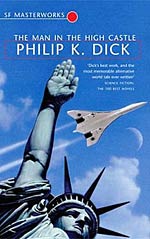
![]() attackofthebooks
attackofthebooks
3/24/2015
![]()
Even though it's an "oldy and goldy," I had to watch a pilot for an Amazon original based on The Man in the High Castle before I got around to reading the book. And, to be honest, I'm a little embarrassed that it took a TV show to get me to read one of the classics.
Alas, there's no time like the present.
Or the past revisited and just a little bit different. Because the world we find in The Man in the High Castle is an alternate Earth, where Hitler and Japan have won World War II and an uneasy detente has settled over the conquered planet.
It is the 1960s. Africa is a wasteland, destroyed by Nazi experiments, while America is split in spheres of influence between the Japanese and the Germans. Between the Nazi dominated east coast and the Japanese controlled west, the west remains a neutral land, with little interest by the conquering powers in Nevada, Wyoming, Colorado or Utah (what's with that? Don't they know that the Rockies are God's country?). There in the west, a man is writing, writing an alternate history of the world, one in which the Allies won, where Franklin Delano Roosevelt survived an assassination attempt, and the Japanese and German empires were defeated. In a world dominated by an aging Hitler and his cronies, the book is a work of treason.
In this alternate universe, most of the events of the story happen a far from the tectonic shifts in geopolitical events that define the order. Hitler dies, a succession competition begins, and the Japanese begin to brace themselves for an expected war with the Nazis. Instead of zeroing in on these events, Dick combines two plot lines that shows people impacted indirectly by the geopolitical. The two plots are connected only by a relationship between the main characters that occurred prior to the novel. It's a close up look, and if it sacrifices attention to detail for a focus on character, it doesn't seem to harm the book.
That said, the book ends without really resolving the underlying conceit: the book that tells our own history. It is the plot device the drives the The Man in the High Castle, but it ends up as something of an unexplained McGuffin. As a plot device, it is an intriguing connection between the real world--our world--and the alternate world, but the story needs an explanation.
I've read that Dick intended to do a sequel, but for whatever reason never did. If that's the case, it explains why The Man in the High Castle lacks the resolution it needs. In spite of this, the world Dick imagines is interesting, a credible place where more stories could be written. The world that might have been if the Axis had won World War II is an intriguing premise, and many have worked with it. Dick's twist by connecting it with a book that tells our story gives The Man in the High Castle a meta aspect and makes it an intriguing read, well worth the Hugo Award it won.